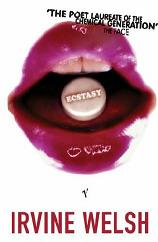 Through the Children’s Gate is Adam Gopnik’s ballad of New York and as such, it is surprisingly beautiful and moving. The New Yorker writer moved back to Manhattan from Paris with his wife and two small children in 2000 before the September 11 attacks. This series of essays covers five years in America’s most famous city, exploring what makes it unique and introducing us to his family, friends and acquaintances along the way.
Through the Children’s Gate is Adam Gopnik’s ballad of New York and as such, it is surprisingly beautiful and moving. The New Yorker writer moved back to Manhattan from Paris with his wife and two small children in 2000 before the September 11 attacks. This series of essays covers five years in America’s most famous city, exploring what makes it unique and introducing us to his family, friends and acquaintances along the way.A number of the essays focus on his children, Luke and Olivia, but where in less skilled hands they could have turned into boring parent brags, Gopnik has produced thoughtful, witty pieces of writing using the children and their thoughts and feelings as a basis and then extrapolating to the rest of the city. He is taking the advice of his late friend, the art historian and sometime football coach Kurt Varnedoe: break it down and then build it up again.
The inter-related essays cover a range of subjects, from the death of a friend to the death of Olivia’s goldfish, from the games children play to the games adults play. “Last of the Metrozoids” is particularly moving. It is the story of Varnedoe's slow death from cancer, even as he composes a set of wonderful lectures on the history of art and builds a football team that never plays a game.
"Bumping into Charlie Ravioli" is a fascinating look at the crazy pace of New York life as perceived by a three-year-old. Olivia's imaginery friend is one Charlie Ravioli, a boy of her brother's age who is working on a TV show and never has time to actually play with her. She just bumps into him, jumps into a cab, grabs lunch - until he becomes so busy that he no longer has time even to speak to her. Then the relationship is conducted through his personal assistant.
The attacks on New York are always there in the background, but Gopnik shows that life goes on even in the face of fear and uncertainty because there is no other choice. This is an entirely different New York than that shown by Candace Bushnell in her Sex and the City stories: less glamorous but all the warmer, more intelligent and real for it.
The only part of the collection that is off-putting is the introduction. I nearly threw the book aside in frustration in the first 10 pages at the writing style. It was as though Gopnik had challenged Henry James to a convoluted sentence contest and came horribly close to winning. But the essays themselves are another kettle of ravioli. The writing is simple and evocative and shows a complete dedication to his family that is touching without becoming cloying. It is hard to believe that stories that take as their bases subjects such as baseball cards, a school play of Peter Pan and a children's chess tournament could be so revealing of adult life, yet Gopnik has managed it.

